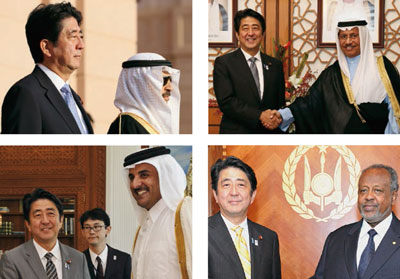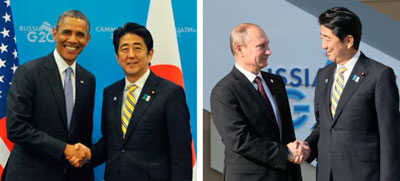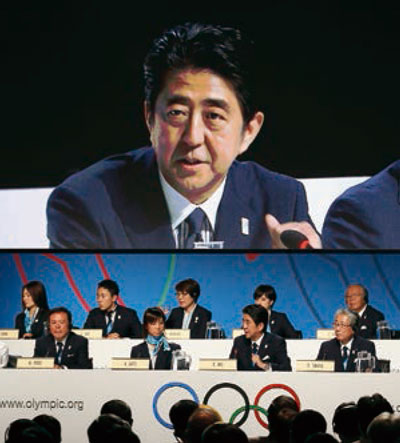Home > Highlighting JAPAN > Highlighting Japan September 2013 >Mount Fuji, World Heritage Site
Highlighting JAPAN
Prime Minister's Diary
Prime Minister Visits the Middle East and the Republic of Djibouti

Clockwise from top left: Prime Minister Abe with Prime Minister Khalifa bin Salman Al Khalifa in Bahrain, Prime Minister Abe shaking hands with Prime Minister Jaber in Kuwait, Prime Minister Abe with President Isma誰l Omar Guelleh in Djibouti, Prime Minister Abe with Amir His Highness Sheikh Tamim Bin Hamad Al Than in Qatar
Prime Minister Shinzo Abe visited the Kingdom of Bahrain, the State of Kuwait, the Republic of Djibouti and the State of Qatar from August 24 to August 29.
The objectives of Prime Minister Abe's visit to the Middle East were (I) to further strengthen and expand the "comprehensive partnership towards stability and prosperity" between Japan and the Middle Eastern countries, and (II) to encourage Japan Self-Defense Forces personnel engaged in anti-piracy activities in a tough environment and strengthen Japan's relations with Djibouti.
Based on the strong bonds with these countries, as demonstrated by the 40th anniversary of the establishment of diplomatic relations with Japan and the heartfelt support given to Japan in the wake of the Great East Japan Earthquake in March 2011, Prime Minister Abe confirmed with their leaders plans to build a "comprehensive partnership towards stability and prosperity," to cooperate in wide-ranging areas of the economic field beyond resources and energy, and to build multilayered relations, including political and security areas as well as cultural and personnel exchanges.
Seeds sown by Prime Minister Abe when he visited the Middle East in 2007 have borne their fruit one after another. He confirmed Japan's policy to continue to contribute to the region in various fields, including education, infrastructure, medicine and agriculture, using its technology and know-how in coordinated efforts of public and private sectors.
The Middle Eastern leaders expressed strong hopes that the Japanese economy will become rejuvenated by utilizing the vitality of the fast-growing Middle East and that Japan will play an even more active role in the region not in the field of economy but political area as well. They highly valued the JSDF, and Prime Minister Abe affirmed the need for Japan to further contribute to the region's peace, stability and prosperity.
Following Prime Minister Abe's visit to the Middle East in May this year and the hosting of the Fifth Tokyo International Conference on African Development (TICAD V), Japan took a big step toward strengthening its relations with the Middle East and Africa with this latest visit. The visit marked also as a historic visit for building a new relationship between Japan and the Gulf countries.
G20 St. Petersburg Summit

Left: Prime Minister Abe with President Barack Obama at G20 St. Petersburg. Right: Prime Minister Abe with President Vladimir Putin at G20 St. Petersburg
On September 5, Prime Minister Shinzo Abe, who visited the Russian Federation to attend the G20 St. Petersburg Summit, held talks in the morning with Ms. Dilma Vana Rousseff, President of the Federative Republic of Brazil, and Ms. Cristina Fernandez de Kirchner, President of the Argentine Republic.
In the afternoon, Prime Minister Abe held talks with Mr. Vladimir Vladimirovich Putin, President of the Russian Federation, and Mr. Barack Obama, President of the United States, following which the Prime Minister attended the first working meeting of the G20.
Tokyo Elected as the Host City of the Olympic Games in 2020

The 125th IOC Session in Buenos Aires in Argentina
On September 8, at the 125th International Olympic Committee (IOC) Session held in Buenos Aires in Argentina, Tokyo was elected as the host city of the 32nd Olympic Games and the 16th Paralympic Games. Prime minister Abe gave a presentation in this session.
"Distinguished members of the IOC, I say that choosing Tokyo 2020 means choosing a new, powerful booster for the Olympic Movement.
Under our new plan, 'Sport for Tomorrow,' young Japanese will go out into the world in even larger numbers. They will help build schools, bring in equipment, and create sports education programs. And by the time the Olympic torch reaches Tokyo in 2020, they will bring the joy of sports directly to ten million people in over one hundred countries.
Choose Tokyo today and you choose a nation that is a passionate, proud, and a strong believer in the Olympic Movement. And which strongly desires to work together with the IOC in order to make the world a better place through the power of sport. We are ready to work with you. Thank you very much. "
Photographs courtesy of the Public Relations Office of the Government of Japan, Text courtesy of the Ministry of Foreign Affairs of Japan website.
© 2009 Cabinet Office, Government of Japan






